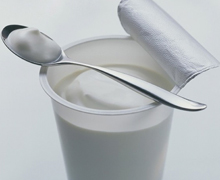
The connection between gut health and overall body health is continuing to be explored and new research shows how it affects the brain. Scientists from the University of Virginia discovered how Lactobacillus, which is a probiotic bacterium found in fermented foods like yogurt, is able to help the body manage stress and may even help prevent anxiety and depression.
Researchers at UVA say this discovery is important because it narrowed in on the role Lactobacillus plays apart from the numerous other microorganisms that can be found in the human body. They published their findings in the journal Brain, Behavior and Immunity.
"Our discovery illuminates how gut-resident Lactobacillus influences mood disorders, by tuning the immune system," said Alban Gaultier, of UVA's Department of Neuroscience, its Center for Brain Immunology and Glia and the TransUniversity Microbiome Initiative. "Our research could pave the way toward discovering much-needed therapeutics for anxiety and depression."
Researchers have been trying to find ways to improve health through the use of probiotics, beneficial gut bacteria, ever since it was first discovered there is a connection between gut health and overall health. That has been a challenge since it is estimated there are nearly 40 trillion microorganisms in the body. Scientists are continuing to understand the balance of microbes and how the different bacteria work together.
Gualiter and colleagues previously found that Lactobacillus was beneficial in helping combat depression in laboratory mice. That promising discovery led them to look deeper for the reason and how that may translate to humans.
"We were aware from our prior research that Lactobacillus was beneficial in improving mood disorders and was lost following psychological stress, but the underlying reasons remained unclear, primarily due to the technical challenges associated with studying the microbiome."
Researchers are hoping depression can one day be treated through the use of probiotics.
"With these results in hand, we have new tools to optimize the development of probiotics, which should speed up discoveries for novel therapies," researcher Andrea R. Merchak said. "Most importantly, we can now explore how maintaining a healthy level of Lactobacillus and/or interferon gamma could be investigated to prevent and treat anxiety and depression."
Click here to read more in the journal Brain, Behavior and Immunity.
